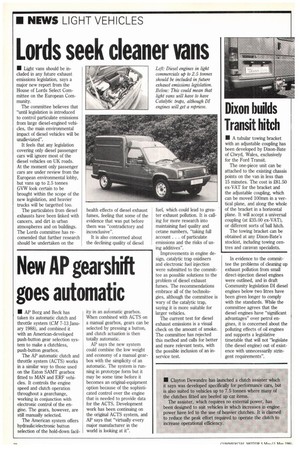Lords seek cleaner vans
Page 34

If you've noticed an error in this article please click here to report it so we can fix it.
• Light vans should be included in any future exhaust emissions legislation, says a major new report from the House of Lords Select Committee on the European Community.
The committee believes that "until legislation is introduced to control particulate emissions from large diesel-engined vehicles, the main environmental impact of diesel vehicles will be tmalleviated".
It feels that any legislation covering only diesel passenger cars will ignore most of the diesel vehicles on UK roads. At the moment only passenger cars are under review from the European environmental lobby, but vans up to 2.5 tonnes
.171AT look certain to be brought within the scope of the new legislation, and heavier trucks will be targetted too.
The particulates from diesel exhausts have been linked with cancers, and dirt in urban atmospheres and on buildings. The Lords committee has recomended that further research should be undertaken on the health effects of diesel exhaust fumes, feeling that some of the evidence that was put before them was "contradictory and inconclusive".
It is also concerned about the declining quality of diesel fuel, which could lead to greater exhaust pollution. It is calling for more research into maintaining fuel quality and cetane numbers, "taking full account. . . of particulate emissions and the risks of using additives".
Improvements in engine design, catalytic trap oxidisers and electronic fuel injection were submitted to the committee as possible solutions to the problem of diesel exhaust fumes. The recommendations embrace all of the technologies, although the committee is wary of the catalytic trap, saying it is more suitable for larger vehicles.
The current test for diesel exhaust emissions is a visual check on the amount of smoke. The committee has rejected this method and calls for better and more relevant tests, with the possible inclusion of an inservice test. In evidence to the committee the problems of cleaning up exhaust pollution from small direct-injection diesel engines were outlined, and in draft Community legislation DI diesel engines below two litres have been given longer to comply with the standards. While the committee agrees that the diesel engines have "significant advantages" over petrol engines, it is concerned about the polluting effects of oil engines and supports a legislative timetable that will not "legislate (the diesel engine) out of existence with unnecessarily stringent requirements".




































































































